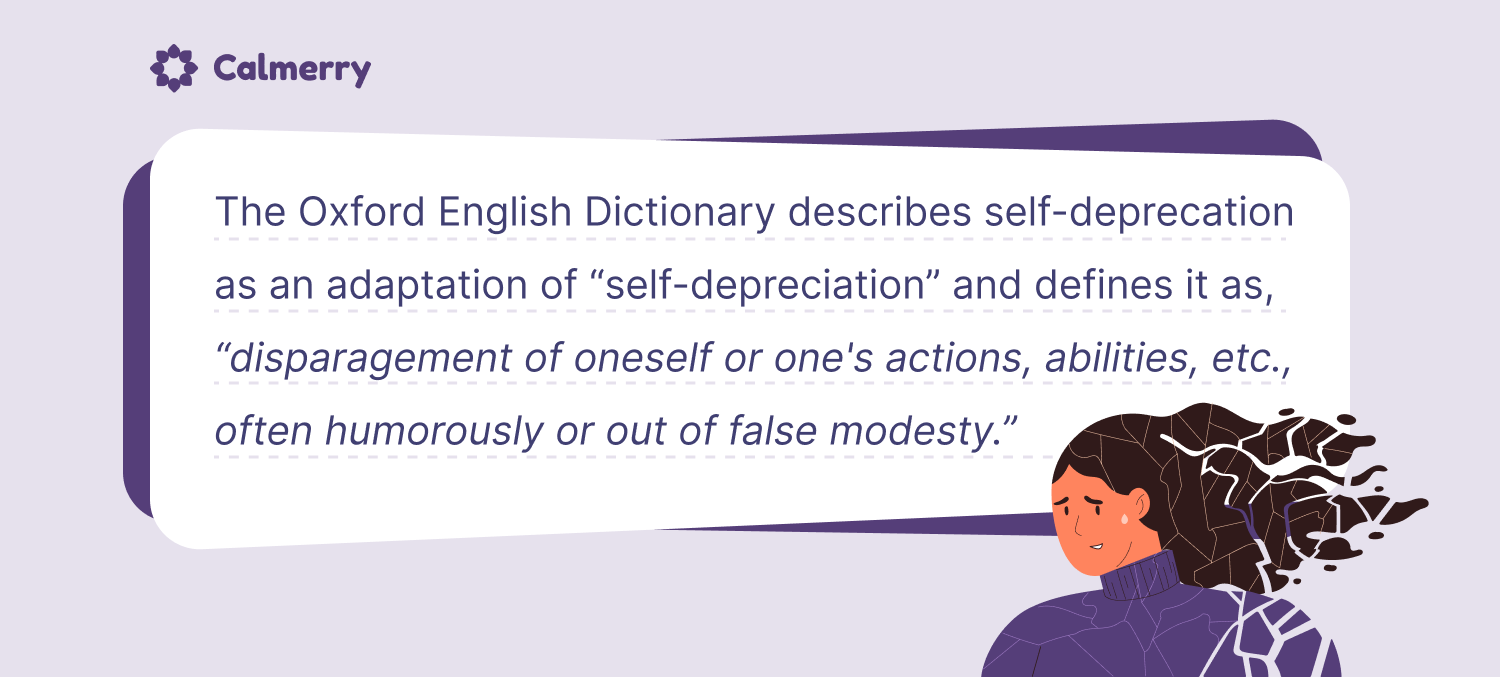Crossing the Line: When Self-Deprecation Turns Into Self-Hate

In this article
Most of us would prefer to be thought of as down-to-earth and funny rather than egotistical or narcissistic. People who are able to use humor to make fun of themselves or recognize their flaws can come across as self-aware, appealing, and approachable.
Yet, there’s a fine line between humility and self-deprecation. Phrases such as “it was nothing” and “I’m such an idiot” are so common we often don’t notice how damaging they can be.
What is self-deprecation?
Researchers have found that self-deprecation can arise from a self-protective place to:
- Make light of a heavy situation
- Make other people laugh
- Promote a sense of modesty
- Appear agreeable or gain support
- Deflect or attempt to mask another issue
- Preempt potential negative feedback from others
In 1958, John F. Kennedy used his self-deprecating wit to drown out the noise of critics who claimed that the US election was being bought by his wealthy father. He quipped, “I just received the following wire from my generous daddy: ‘Dear Jack, don’t buy a single vote more than is necessary. I’ll be damned if I’m going to pay for a landslide.’”
Yet, self-deprecation can also cross the line into self-sabotage and fuel low self-esteem. The tendency to denigrate or disparage oneself has been linked to depression and anxiety. It can also put a strain on your relationships by forcing other people into the position of constantly feeling like they have to prop you up or manage your fragility.
What does self-deprecation mean?
In The Remarkable Rocket, a short story by Oscar Wilde, a talking firework called Rocket is told by a dragonfly that the frog he is speaking to has already swum away. In response, the Rocket says,
”I am not going to stop talking to him merely because he pays no attention. I like hearing myself talk. It is one of my greatest pleasures. I often have long conversations all by myself, and I am so clever that sometimes I don’t understand a single word of what I am saying.”
The last line, “I am so clever that sometimes I don’t understand a single word of what I am saying,” is often used as a quote exemplifying self-deprecation.

In practice, self-deprecation might show up as:
- Not being able to take a compliment (“This old thing?”)
- Low self-esteem (“I couldn’t wear that”)
- An instinct to downplay yourself and your efforts (“It’s no big deal”)
- A belief that if you acknowledge your skills and accomplishments, you’ll come off as pompous and arrogant
Self-deprecating humor
Self-deprecation is most often packaged in the form of a joke. It could be about your appearance, behaviors, performance, something from the past, or any other personal issue.
When done well, it recognizes the limitations of all humans and makes fun of the high expectations that we set for ourselves. This form of humor can break the ice in tense situations and help people feel at ease. It can also promote camaraderie and even self-acceptance.
What causes self-deprecation?
Self-deprecation might stem from a place of not taking yourself too seriously or recognizing the social power of comic relief.
It can also emerge from a deeper, more harmful feeling of self-doubt or even self-hatred, which can hold a person back and cause a great deal of suffering. This negative self-image may arise from:
- Previous trauma
- Perfectionist mindset
- Mental health issues
Trauma
When a person experiences a traumatic event, the entire world can begin to feel unsafe. Inner narratives of being undeserving of love or lacking self-worth can be protective and can also develop from criticism or perceptions gained from abusive caregivers and partners.
Perfectionism
Perfectionism is another source of self-criticism that can be intertwined with trauma but can also arise separately. It’s wonderful when a person takes pride in what they do and it’s normal to want to be validated for it.

Perfectionism takes this to the next level, leading a person to develop a sense that they are permanently flawed or defective, therefore fueling the flames of their inner critic.
Mental health disorders
Self-criticism is both a symptom and contributor to Major Depressive Disorder and other mental health conditions including anxiety, eating disorders, and bipolar disorder. Like perfectionism, it involves a tendency to set unattainable standards for yourself and consistently feel disappointed when you can’t meet them.
4 signs that your self-deprecation has gone too far
A strong inner critic can be exhausting and suck the joy out of your life, highlighting each and every flaw and causing a shame eruption for tiny missteps or mistakes. You might find yourself thinking:
- “Here I go screwing up again.”
- “I shouldn’t even try.”
- “No one wants to have anything to do with me.”
- “If they knew the real me, they wouldn’t come around.”
Below are the four signs that your self-deprecation may have reached an unhealthy level.
You can’t take a compliment
Think of how you typically act when someone compliments you. You may feel giddy and excited that someone is taking note of your good qualities, you may clam up and feel shy, or you may even feel completely repulsed.
Extreme discomfort with praise might point to an issue of low self-esteem. When you experience yourself as deeply flawed and undeserving, a compliment doesn’t make sense and may even feel scary. It goes against your entire belief system of being unworthy.


If it’s hard to take a compliment and you’re constantly putting yourself down when someone tries to praise you, it’s time to take a closer look at your self-deprecating tendencies.
Your knee-jerk response is to self-deprecate
For some people, making fun of themselves is like clockwork. If your instinct is to make fun of yourself or minimize your accomplishments, it’s important to explore where this is coming from, and why.
It’s perfectly ok to be humble and to find the humor in your own shortcomings. Still, it’s also necessary to be able to acknowledge and appreciate the good things about yourself.
No one else is laughing
There’s nothing more awkward than saying something you think is going to evoke all-out laughter only to have the entire room go silent. People can often sense when your jokes are coming from a dark and sad place. They may even tell you that what you are saying is not funny or that they feel uncomfortable.
If your self-deprecating jokes are consistently falling flat, it’s a clear sign that you’re going overboard and need to do some reflecting on where it’s coming from.
You continue to self-deprecate when you’re alone
If you’re making fun of yourself or putting yourself down when no one else is around, you might begin to believe the self-deprecating jokes that you’re making. At some point, they might not even be jokes at all.
The impact of self-deprecation
If you’re consistently downplaying your skills or effort, you might really start to internalize self-hatred. It can also rub off on the people around you. What was once an innocent laugh, can ultimately undermine your authority and diminish the impact of your actual achievements.
Self-deprecation can also:
- Damage your self-esteem: The negative comments can be internalized and impact your sense of self-worth.
- Take a toll on your mental health: When you’re continually sending yourself the message that everything you work for isn’t that big of a deal or that you don’t measure up, it can put a strain on your mental health.
- Deplete your optimism: When everything you do is minimized, you might start to feel less excited about putting yourself out there or trying something new.
- Damage your relationships: If you’re always joking, people might not feel like they can get to know the real you.
- Impact movement on the career ladder: If you’re constantly minimizing your skill and hard work, it can impact your chance of getting noticed and promoted.
It’s possible to maintain a healthy balance
It’s possible to make fun of yourself and love yourself at the same time, though it requires thoughtful attention and self-care.
If your self-deprecation has gone overboard, try the following 5 methods to regain your self-esteem and find that healthy balance.
Accept compliments graciously

Rather than making a joke every time someone pays you a compliment, try saying a simple “thank you”. If you’re uncomfortable, leave it there and later explore why it is so hard for you to accept praise.
Let it out in your journal
Journaling can help you sort through your thoughts and emotions in a safe place. Try writing about the times that your instinctual reaction was to self-deprecate. Explore what you could have said instead, including acknowledging when you’ve done something well.
Give yourself the benefit of the doubt
Make a conscious decision to give yourself the benefit of the doubt like you would for any close friend. Instead of saying, “I’m so dumb,” you could say, “I’ve been juggling a lot and forgot to complete that one task. It happens. I’ll get working on that now.”
Don’t feed into the self-deprecation of others
When you notice the tendency of a friend, family member, or colleague to self-deprecate, try speaking up rather than laughing it off. You can challenge the narrative by offering a different perspective, “forgetting your keys does not equate to being a moron.” Or “How about saying something kind to yourself instead.” As you do this, you’re creating a culture that promotes positive self-talk.
Get professional support
Your online therapist can support you in getting to the root of your self-deprecating behavior. If you’re struggling with self-hate or self-doubt, counseling gives you an opportunity to work through these issues so that you can learn to celebrate yourself, be authentic, and feel comfortable with praise.
Conclusion
Although self-deprecation can be a nice feature of humor, it can also get out of control, fueling self-esteem issues and creating problems in communication. If you realize that you make self-deprecating jokes way too often, it might be a sign that you need self-esteem therapy.
Don’t hesitate to ask for help and get matched with a licensed therapist from your state within an hour. You deserve to be loved, especially by yourself.
online therapy
live video session



